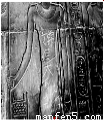题目内容
to come over to cheer you up. If you're happy, it might respond by playing your favorite game with you.
Does it sound like something out of a science-fiction movie? Well, it's really something out of the Georgia
Institute of Technology. Irfan Essa works at the computer lab there. He has developed a computer system
that can look at you and recognize your mood. He calls it the "expression recognition system." Essa says, "We
are trying to get computers to act like a human brain. But the human brain is not like one computer, it is like
many working together."
In Essa's system, many computers work together. First, a camera in the bedroom takes a picture of your
face. The camera feeds the image to a computer. In the computer's memory, there are pictures showing how
the muscles of your face move when you are in different moods. For example, cheek muscles move in one
way when you are happy and smiling and in another way when you are nervous and tense. The computer
compares your picture to the face-muscle images stored in its memory. It tries to find the best match.
That's how it figures out your mood! Then the computer sends messages to other computers in the system.
If you look happy, a computer may put on lively music. If you look tired and discouraged, a different
computer may turn on the TV for you.
How could the "expression recognition system" help us in important ways? Essa thinks that the system
can help us create computers that are better teachers. Many people learn new skills through computer
programs. "When I teach, I look at people's faces," Essa explains. "If my students look confused, I know
they didn't understand. With this technology, a computer canal-so know if a student is learning."
Today, this new technology can be found only in labs, but Essa predicts we'll see it out of the lab in a
few years. So get ready. One day, you might walk into a room that will soon become your best friend.
___________________________________________________________
2. What happens first in the bedroom in Essa's system?
___________________________________________________________
3. Will the computer put on lively music or turn on the TV if you look happy?
___________________________________________________________
4. How does the "expression recognition system" make computers better teachers?
___________________________________________________________
5. What will future rooms be like?
___________________________________________________________
2. A camera in the bedroom takes a picture of your face.
3. Put on lively music.
4. It can help computers to know if a student is learning.
5. They will be friendly, smart, more comfortable, and more modern.
(答案不唯一)

 阅读快车系列答案
阅读快车系列答案任务型阅读。阅读短文,根据其内容完成表格。
People in the United States have a national vacation on Monday in most months. So people may have a vacation on Saturday, Sunday and Monday. During the vacation, people can rest, go to interesting places or do some other things with their families. There are three great days in the United States. They are New Year’s Day, Christmas Day and Thanksgiving Day. During the days, most businesses close. People can stay at home and have fun with their families.
People in the United States usually have more than 2 weeks of paid vacation(带薪休假) anytime in a year. This usually depends on how long people have been working or what their jobs are. Usually the more time they spend working, the more time they may get for vacation.
| Vacation | When | What to do |
| A national vacation | Saturday, Sunday and (66) ____________ | People can (67) ____________, go sightseeing or do some other things. |
| Three great days | New Year’s Day, Christmas Day and (68) ____________ | People can stay at home and (69)____________ with their families. |
| Paid vacation | More than (70) ____________ days anytimein a year | People can have a long journey. |
